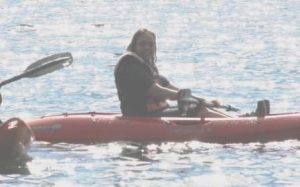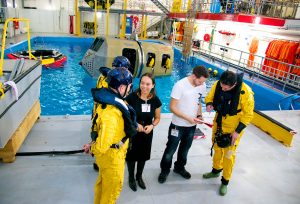About

Dr Sarita Robinson completed her PhD in Cognitive and Neuroimmune responses to Survival Situations under the supervision of Dr John Leach at Lancaster University. Her PhD research was carried out using simulated emergency situations (such as Helicopter Underwater Evacuation Training) to examine how the biological changes in the body and people‘s perceptions of threat impact on mental processing. Prior to this she obtained a BSc (Hons) in Psychology at Lancaster University, and a Masters degree in Cognitive Science at Manchester University. Once being awarded her PhD in 2004, Sarita has gone on to expand her research at UCLan and has focused on the three main stages of a disaster.
1) Preparedness behaviours: What behaviours does a person who is likely to be a victim engage in before a disaster strikes? What behaviours set survivors apart (and what are the barriers to us all adopting these behaviours)? For example, the UK is a nation of pet lovers. We really love our fur babies. Unfortunately it would appear that we might not properly prepare for our pets if we need to evacuate our homes in a hurry. This means we might not leave our homes even if a major disaster has occurred (like a chemical incident or a flood). Sarita has researched the issues which are major barriers to survival and offers talks and training on how to psychologically prepare yourself in order to face emergency situations with confidence.
To read more about barriers to surviving in disaster situations you can download these papers which were first published in the Institute of Civil Protection and Emergency Management’s practitioner journal Alert (Barriers to compliance, and Human Behaviours in emergency situations).
2) Response during a disaster: Sarita has explored how the body and brain respond in high threat situations by examining how people respond during a simulated disaster situation. By working closely with Fleetwood Nautical College Sarita has taken a hands on approach to understanding the impact of emergency situations.
 The findings from Sarita’s work can help us build resilience that can help us cope not only with disasters but with everyday life. In order to gain a better understanding of how the brain works under pressure Sarita often undertakes survival training such as Firefighting or Coastal Survival Training. To read some of Sarita’s academic papers you can view them via her Academic Webpage (click here to transfer).
The findings from Sarita’s work can help us build resilience that can help us cope not only with disasters but with everyday life. In order to gain a better understanding of how the brain works under pressure Sarita often undertakes survival training such as Firefighting or Coastal Survival Training. To read some of Sarita’s academic papers you can view them via her Academic Webpage (click here to transfer).
3) Recovery from trauma: Sarita is also interested in how people recover from exposure to life-threatening events. People may be familiar with the idea of Post Traumatic Stress Disorder. Less well known is the idea of Post Traumatic Growth. This is the idea that some people can experience positive growth as a result of facing life-threatening situations. Sarita has been working with a team who are examining how and why some people report positive outcomes as a result of traumatic experiences. Sarita is also interested in how we help people stay psychologically healthy and how exposure to the natural environment can help us. (Click here to read more – Health, Well-being and Nature).
As well as lecturing and researching in Survival Psychology, Sarita is also a committee member of the British Psychological Society’s Crisis, Disaster and Trauma Section. She also offers consultancy under the University of Central Lancashire’s PROTECT programme.